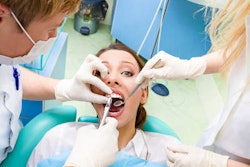
The U.S. Department of Health and Human Services (HHS) published a rule on June 20 that expands the use of health reimbursement arrangements (HRAs). The new policy creates a special type of HRA that employees can use for dental premiums and other qualified medical expenses.
Health reimbursement arrangements are tax-preferred group health plans, according to the International Revenue Service (IRS). Unlike health savings accounts, HRAs are solely funded by employers and do not count toward the employee's income for tax purposes.
The rule creates a new type of tax-preferred account, the excepted benefit HRA. This account allows employers who offer traditional group health plans to also provide an HRA benefit of up to $1,800 for qualified medical expenses, including dental, vision, and long-term care insurance. Unlike other types of HRAs, employees do not have to be enrolled in a group health plan to receive these reimbursements.
 HHS Secretary Alex Azar. Image courtesy of Christopher S. Smith, HHS.
HHS Secretary Alex Azar. Image courtesy of Christopher S. Smith, HHS.The rule also allows employers to set aside tax-advantaged dollars for employees to buy plans on the health insurance exchanges. This change was designed to provide employers and employees with more flexibility in their healthcare decisions, according to HHS Secretary Alex Azar.
"Too many Americans today have little say in how their healthcare is financed," Azar stated in an HHS press release. "President Trump has promised Americans that he will put them in control of their healthcare, and this expansion of health reimbursement arrangements will help deliver on that promise by providing Americans with more options that better meet their needs."
The new HRAs will go into effect on January 1, 2020. The department expects the change to benefit small businesses, employees who have only one choice of health insurer through their employer, and about 800,000 employees who were previously uninsured.
HRAs and affordable dental care
As dental care has become increasingly unaffordable for U.S. adults, dental organizations see tax-preferred plans, including HRAs, as one strategy to help Americans afford oral healthcare. The ADA, in particular, supports these plans.
In December 2018, ADA President Jeffrey Cole, DDS, and Executive Director Kathleen O'Loughlin, DMD, wrote a letter to the IRS commissioner in support of HRAs. Although they hoped the $1,800 cap on excepted benefit HRAs would be higher, they praised the role tax-preferred accounts have on affordable care.
"We support the use of tax-preferred accounts for medical and dental expenses," Drs. Cole and O'Loughlin wrote. "As an organization dedicated to assisting its members in advancing the overall oral health of the public, the ADA recognizes that these accounts play an important role in ensuring that consumers can afford care."



















